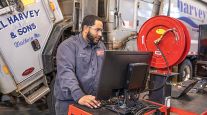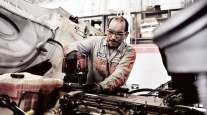Fleets Outsource Major Maintenance Work to Reduce Tool, In-House Labor Expenses
This story appears in the Nov. 4 print edition of Transport Topics.
When A. Duie Pyle needs an engine overhauled or major transmission work done, the company sends the work to an off-site maintenance shop rather than using in-house mechanics.
The reasons are twofold, according to the fleet’s maintenance director: It’s hard to duplicate the level of expertise mechanics specializing in these repairs have, and the tools needed for them are expensive — unlike the tools needed to work on maintenance areas such as brakes, suspensions and lubrication.
“You may have a dealer or vendor that performs that function on a regular basis and becomes very proficient at it. Whereas, our tech maybe only sees it one or two times a year,” said Dan Carrano, A. Duie Pyle’s director of maintenance.
Additionally, he has to justify a return on investment for the tooling — the purchasing of tools — and the numbers don’t always pencil out. That’s when he opts to send work out to someone else, said Carrano, whose company is based in West Chester, Pa., and has 12 shop locations with 98 technicians on staff.
A. Duie Pyle ranks No. 85 on the Transport Topics Top 100 list of the largest U.S. and Canadian for-hire carriers.
In 2011, research firm MacKay & Co. conducted a survey asking fleets where they get service for Class 8 and medium-duty vehicles and trailers. MacKay found that 76% of respondents did the work in-house, 11% went to a dealer, 8% to an independent garage and 3% to a leasing company, with the rest classified as miscellaneous, said Molly MacKay Zacker, president of the Lombard, Ill., firm.
“This is a big-picture look at maintenance. If you look at something like engine rebuilds, a much smaller number of fleets would do their own,” MacKay Zacker said, adding that outsourcing major engine work makes sense, as fleets typically don’t have the technology or diagnostic codes needed to complete the repairs in-house.
Kyle Treadway, president of Kenworth Sales Co., in West Valley City, Utah, agreed. He said it takes a critical mass of work to justify the specialized tooling needed for engine rebuilds, transmission repairs and alignments.
“When we invest, we do the math and decide how long it will take to pay for itself,” he said.
A lot of that cost involves the purchase of technology.
Matt Flynn, manager of aftermarket training for Greensboro, N.C.-based Volvo Trucks — which includes sister company Mack Trucks — said new technologies have made the use of computers for diagnostics and service information a requirement.
“Software and technology updates are necessary and often required to meet rapidly changing emissions regulations. We have also been able to introduce new technologies, like remote diagnostics, which helps maximize vehicle uptime through proactive diagnostics,” Flynn said.
Ray Walton, manager of technical training operations at Mack Trucks, also based in Greensboro, said, “Technology is rapidly changing to meet regulations [and] enhance the customer experience. With a relevant technology change, Mack Trucks Academy lays out a training plan to ensure we provide the necessary training to maximize vehicle uptime.”
However, the usefulness of the technology tends to have a short shelf life, making it difficult to justify the expense.
For example, Treadway said, up-coming engine changes will “multiply the [technology] tooling” that shops need to purchase.
“In the last decade, we’ve seen a rapid succession of changes in technology, so the life of a specialized diagnostic or repair tool is much shorter,” Treadway said.
“We’re already working on the fourth version of [Paccar Inc.’s proprietary software for diagnostics and repair] . . . in the last six years,” Treadway said, adding that it costs about $5,000 per laptop to install.
“If you have 20 techs and you want to install it so they’re all able to use it, you could spend $100,000,” said Treadway, whose company operates 20 branches in the Mountain and Western states.
As for the cost of running a shop, Mike Dennis, group director of field maintenance for Ryder System Inc., said, “For a private fleet to stay up on the latest training and tooling, it is not only a challenge, it is very expensive.”
Miami-based Ryder Supply Chain Solutions, which ranks No. 10 on the for-hire TT100, has more than 800 service locations and 5,000 technicians to maintain its vehicles, customer leases and outside fleets. Yet even for Ryder, some equipment is too expensive.
“We look at our current shop infrastructure and how long we’d have to use the equipment before we could get a payback,” Dennis said.
For example, Ryder hasn’t been able to justify a return on investment for equipment to clean its diesel particulate filters.
“We look at our fleet size, the average cleanings, the frequency we have to use it, the cost of the equipment and the installation and the cost of the training and the expertise,” Dennis said.
At FSX Equipment, based in Granite Falls, Wash., most sales of its diesel particulate filter cleaning equipment are going to dealers, company co-owner Drew Taylor said. Most Paccar, Navistar and Cummins dealers have the machines, and now Freightliner and private fleets are starting to come on board, he explained. The system costs $48,700 and requires a 30-horsepower compressor to operate, which can add $16,000 to the price.
Mike Delaney, CEO of maintenance company WheelTime, in Greensboro, N.C., said an increasing number of fleets are combining in-house and third-party maintenance.
“It isn’t a question of either/or. It is a question of convenience and profitability,” Delaney said.
C.R. England Inc. Executive Vice President Todd England said the Salt Lake City-based carrier also leaves its major engine and transmission work to outside vendors. Everything else is performed in-house.
But England said that when the refrigerated carrier — which ranks No. 19 on the for-hire TT100 — outfitted its new shop in South Holland, Ill., it spent about $500,000 on tooling, equipment and supplies.
“It is a balance between operational demands and what we’re willing to invest in terms of infrastructure,” England said. “We can be more efficient and control cost better with our own mechanics and facilities.”
C.R. England found it spends less on over-the-road repairs when maintenance is done in-house.
“We’re talking $200 to $300 per tractor. That is where we see the real value of doing it in-house,” England said, adding that typical repairs include minor electrical issues, air leaks and hose chafing. The carrier operates eight shops nationwide.
He also said most new shop tooling the company purchases involves new technology.
“We’re buying more computers and software and new devices to access fault codes and more data,” England said.
And Mike Arzamendi, dealer training manager for Peterbilt Motor Co. in Denton, Texas, said the most important trend in truck service today is electronic troubleshooting.
“The most valuable service-shop equipment is often a computer equipped with up-to-date diagnostic software,” he said, adding that software changes are ongoing as Peterbilt fine-tunes and recalibrates programs.
Dan Ouillette, supervisor of mechanical engine support development for Daimler Trucks North America — which owns Portland, Ore.-based Freightliner Trucks and engine-maker Detroit Diesel Corp. — said Detroit offers a variety of mechanical and electronic tools that are not available commercially to complete repairs, including a branded diagnostic link and a branded reprogramming station.
“We also have tools that can range from a custom lifting device to a special wrench made for accessibility,” he said.
Daimler typically has two major releases of diagnostic software a year, and two to four minor releases, Ouillette said: “These updates include support for new [engine control unit], new troubleshooting panels and correction of software issues.”
Engine-maker Cummins Inc., based in Columbus, Ind., also has new electronic tooling that enables faster and more accurate diagnoses, said Chris Crowel, manager of specialty market sales and support. However, it often needs updates as new engines are released and as the troubleshooting and repair processes are revised.
“In some cases, this may require the release of new electronic-system tests or additional content in the published service information,” Crowel said.
Nevertheless, fleet managers keep investing in tools. At Averitt Express, which is based in Cookeville, Tenn., and ranks No. 29 on the for-hire TT100, the carrier is making a large tooling investment in laptops.
“Last year, we were at 75% with laptops, and this year, we went to 100%. Our next big step is getting a wireless network so we can use the laptop anywhere in the shop or even outside the shop close to the bays,” said Doug Lloyd, Averitt’s director of maintenance.
The carrier operates 32 shops with 230 technicians, and it spends about 71% of all of its maintenance dollars in-house. Of the 29% performed by a vendor, the bulk of it is on tires.
And Mike Hasinec, vice president of maintenance systems and support at Penske Truck Leasing Co. in Reading, Pa., said, “Over the years, there have been several tools we’ve added to increase productivity based on certain tasks.”
For example, Penske Logistics, which ranks No. 30 on the for-hire TT100, has invested in a system that allowed techs to drain cooling systems faster.
“A lot of times, we actually seek out tools, and the companies we work with will develop tools to help us increase productivity and performance,” Hasinec said.
A. Duie Pyle’s Carrano is considering investing in a trailer tester that allows one tech rather than two to test all the functions on the trailer without a tractor hooked to it.
“We look at tools as investments that will increase productivity, reduce downtime and enhance the work environment,” Carrano said. “Some of the things we purchase, we think, will have an effect in reducing injuries or extend a tech’s career. That is hard to put a price on.”
Dan Engelsen, sales engineer for Innovative Products of America, which is based in Woodstock, N.Y., and makes the Super Mutt trailer tester, said the tool — which costs about $1,600 — shaves 30 minutes off of an inspection.
In some cases, sharing specialized tools among locations can help maximize the investment, which is why A. Duie Pyle has a bank of infrequently used tools in its parts warehouse.
“When technicians are doing a particular job and need that tool, they’ll request it when they put in their parts request,” Carrano said, citing a rear main seal installer as an example.
Truck maker Navistar Inc. did not respond to requests for comment.




